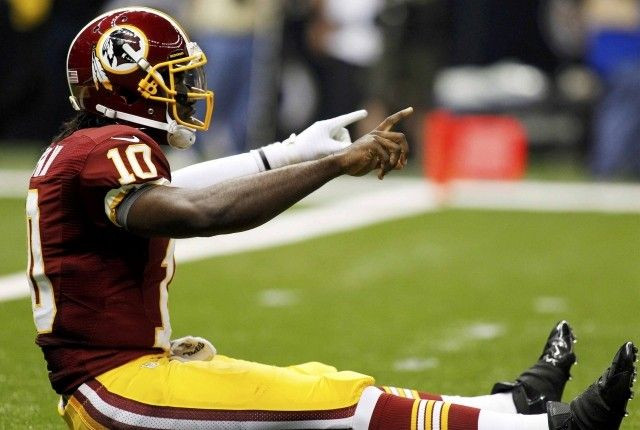Rob Parker On Robert Griffin III: 'First Take' Columnist Questions Whether Star Redskins QB Is A 'Brother Or A Cornball Brother' [VIDEO]

When asked in the past how his race affects him as an athlete, Redskins star quarterback Robert Griffin III has been coy but honest.
He'd rather not talk about the issue, he says, because it has nothing to do with the game he's contracted to play, and the game he loves.
Griffin will, however, talk about race as it pertains to his status as a role model to African-American youth, a position he relishes.
"Because it gives them that motivation, that hey, you know, an African-American went out and played quarterback for my Washington Redskins," Griffin told Chick Hernandez on a Comcast SportsNet special last week. "So I appreciate that; I don’t ever downplay anything like that. Whoever I can go out every week and motivate to do better and to try to go after their dreams, I’m up for that."
The problem for Griffin, however, is that the issue he'd rather not discuss is the issue 24-hour media outlets like ESPN are dying to bat around.
One ESPN program in particular, "First Take", has increasingly become a hotbed of baseless sports journalism, more theater than substance and debate, ironic considering the show's motto is "embrace debate."
"Embrace," in that the network prefers to uncage Skip Bayless and Stephen A. Smith, who we're supposed to believe are the most sworn adversaries, and watch as the two dance around each other while they blare out unnamed sources, coaches and players they've talked to (name-dropping is the currency of "First Take"), and non-topics.
In that fashion, Bayless and the show's producers walked black sports columnist Rob Parker into posing the question of whether Griffin is a "brother or a cornball brother," whatever that means. Parker had the elaboration for the audience.
"He's not really. Okay he's black. He does the thing, but he's not really down with the cause. He's not one of us. … He's not really the guy you want to hang out with."
Parker continued in that vein by likening Griffin's white fiancee and his Republican politics with golfer Tiger Woods' past refusals to discuss racial topics and his racial "standing."
"Tiger Woods was like, 'I have black skin, but don't call me black.' People wondered about Tiger Woods early on," Parker added.
For Parker, the backlash was already fuming when the last regrettable words trembled out of his mouth. Smith, normally far from the most level-headed commentator in the sports media landscape, remarked that he was uncomfortable where the show had gone.
Juxtaposed with Griffin's comments about race the week before, "First Take's" segment made for the worst type of racial debasement, lowering a man by needlessly questioning his identity and creating stereotypes out of thin air for the sake of a cheap talking point. When an athlete wants to discuss race only as it pertains to him proudly serving as a role model, perhaps it should be left at that.
© Copyright IBTimes 2024. All rights reserved.





















